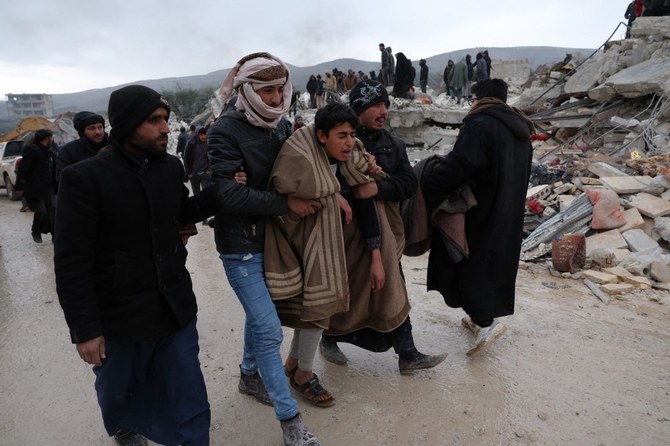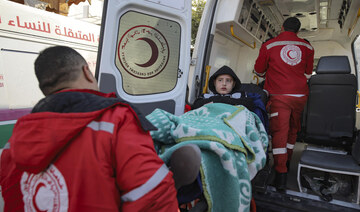JANDARIS: Wailing children, flattened buildings and hospitals full of bodies — a devastating earthquake on Monday looked painfully familiar for Syrian families and rescuers worn down by nearly 12 years of bombardment and displacement.
The 7.8 magnitude earthquake sent people rushing into the streets in the country’s north, where air strikes and shelling have already traumatized the population and weakened the foundations of many buildings.
In the rebel-held town of Jandaris in Aleppo province, a mound of concrete, steel rods and bundles of clothes lay where a multi-story building once stood.
“There were 12 families under there. Not a single one came out. Not one,” said a thin young man, his eyes wide open in shock and his hand bandaged.
“We were pulling people out ourselves at three in the morning,” he said, his breath visible in the cold winter air as he spoke.
Young men could be seen clawing through debris and heaving hammers onto slabs of concrete to look for survivors. Dented water tanks and solar panels had flown off roofs and landed on the damp ground.
The White Helmets, a rescue service founded in rebel-held territory to treat people hurt in bombardment, said at least 147 people were killed in opposition-held northwest Syria. In government-held territory, officials put the death toll at more than 300 with more than 1,000 injured.
In Turkiye, President Tayyip Erdogan said more than 900 people were killed and more than 5,000 injured.
“We are in a race against time to save the lives of those under the rubble. Even if our teams are exhausted, we don’t have time to rest,” White Helmets head Raed Fares told Reuters by phone.
He said air strikes over the years had left buildings structurally fragile so they “immediately collapsed,” ultimately leading to more deaths.
FREEZING TEMPERATURES
Millions of people in northwest Syria have been left vulnerable by the conflict, according to the United Nations, which says 2.9 million people in the region have been displaced and 1.8 million are living in camps.
The rescue teams have worked for years rescuing people from shelling and aerial raids by Syrian government or Russian forces which often hit the same location multiple times, risking paramedics’ lives.
“At least now, no one is going to bomb us as we work,” Fares said.
But the cold winter weather added another challenge for the rescue workers, who said families have been left exposed in near-freezing temperatures and heavy rains.

In the countryside of Idlib province, the earthquake damaged the modest structures set up in displacement camps hosting Syrians who had fled the war over the years, said Ahmad Al-Sheikh, a resident of a nearby border town.
Further west, the main hospital in the rebel-held town of Afrin was teeming with wounded residents writhing on the ground and women struggling to reach loved ones by phone as the lines were down.
Medics zipped up black body bags on a bloodstained floor as toddlers screamed in the background.
“Ambulance sirens are heard everywhere. People are shocked,” said Afrin resident Ibrahim Obaid. “The situation is so tragic. There’s so much fear and we still feel the tremors.”




























